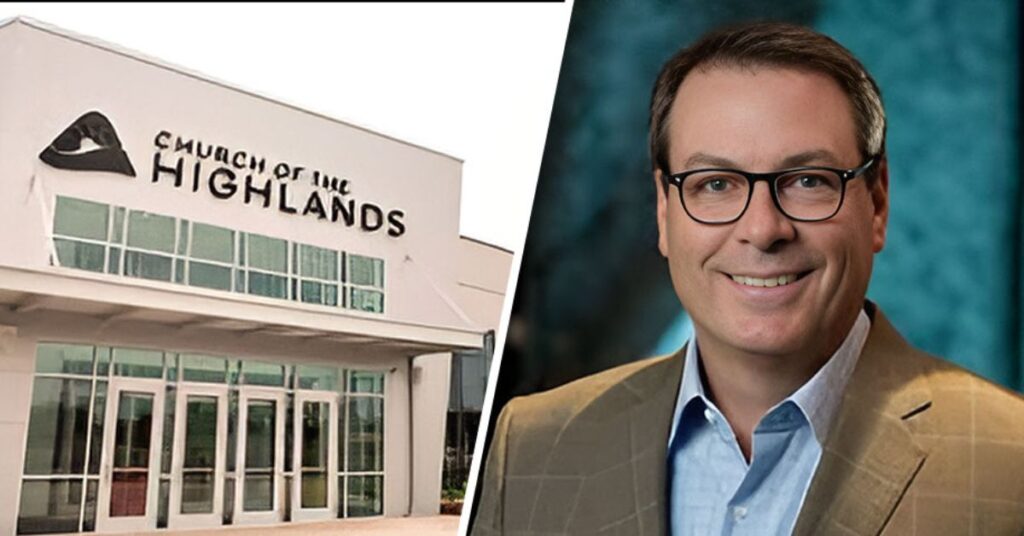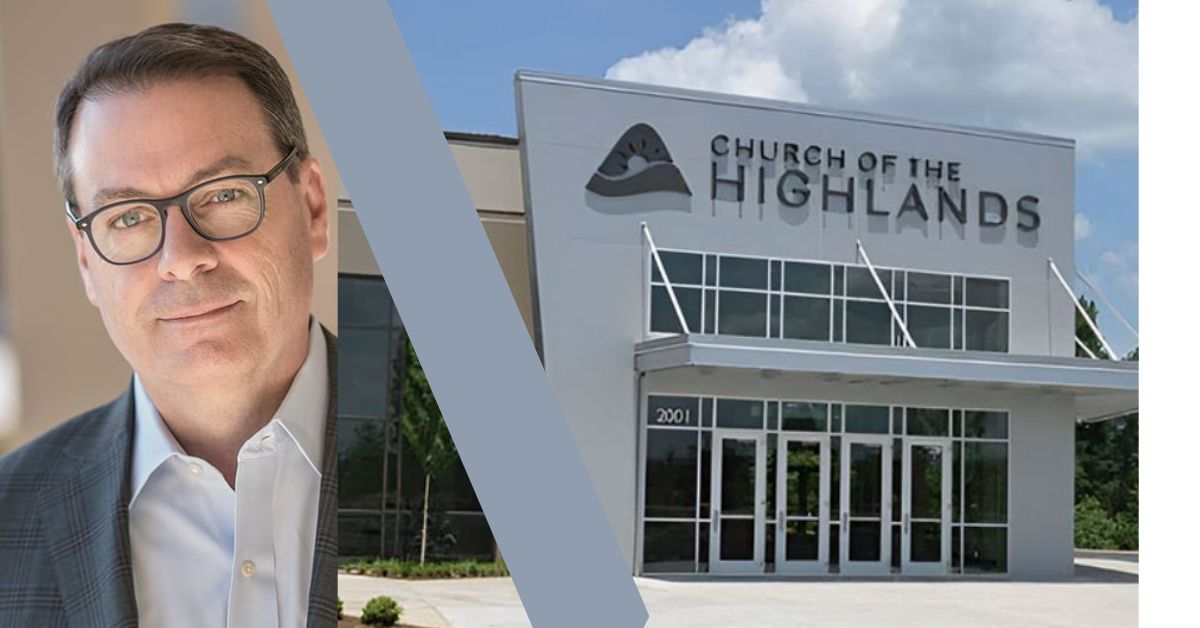When Church of the Highlands first announced plans to open a new retreat called “The Lodge”, questions began swirling. Was this a place for clergy accused of misconduct to find refuge? Or was it truly meant as a respite for pastors struggling with burnout? The church’s lead pastor, Chris Hodges, has now set the record straight – but it’s a complex situation layered with nuance. Let’s take a closer look at the saga surrounding The Lodge.
What We Know About The Lodge’s Origins
The Lodge is a $4.5 million dollar facility that opened in April 2023 on the Church of the Highlands’ Grants Mill Road campus in Irondale, Alabama. With four bedrooms, a conference room, and idyllic surroundings, it was billed as a place for “pastors and ministry leaders to be hosted, refreshed, rejuvenated and refocused on their calling.”
Hodges says the vision was born out of the pandemic when he personally fielded calls from around 20 different pastors on the verge of burnout and wanting to quit ministry. Providing a retreat became a passion project to help get these spiritually drained leaders back on track.
“I want to be known for that,” Hodges stated in a 2021 sermon about assisting ministers going through crises.
A Seed of Doubt Gets Planted
The timing seemed suspicious – it opened the same year Hodges had been involved in the controversial “restoration” of a former pastor named Micahn Carter.
Carter had previously served as lead pastor of Together Church in Washington state. But in 2019, he resigned amidst undisclosed reasons, soon after joining the staff of Church of the Highlands later that year. Hodges says he was asked by Carter’s former overseers to assist in a “restoration process”, only to then learn about a sexual assault allegation against Carter. Church of the Highlands immediately cut ties.
The Carter incident, coupled with vague initial details about The Lodge’s purpose, caused some to wonder if it was secretly a place to rehabilitate “fallen” ministers after misconduct or abuse allegations.
A former church staffer expressed concerns about lack of transparency around The Lodge’s mission. Outside pastoral abuse advocates also sounded alarms about potential abuse coverups.
Hodges Forcefully Rebukes Misconduct Link
In an impassioned interview shortly after the article ran, Hodges firmly rejected the notion that The Lodge would ever be used to harbor clergy accused of sexual misdeeds. He stated clearly, “No clergy accused of sexual misconduct will ever stay at The Lodge.”
The pastor chalked up any confusion to “an unfortunate coincidence” of timing between The Lodge’s opening and the Carter debacle a year earlier. Regarding Carter, Hodges expressed regret over allowing him a platform to preach at Church of the Highlands in 2020 prior to the allegations surfacing.
“I should have never let him have a moment on our stage,” Hodges remarked, adding that he immediately severed ties with Carter upon learning of the accusation against him. Carter has since filed a lawsuit denying the claims.
Shedding Light on Past “Restorations”
While adamant The Lodge was not designed for accused ministers, Hodges did acknowledge assisting pastors in “restoration” from past moral failings on occasion. He cited two specific examples:

In 2013, Hodges welcomed Dino Rizzo to his church staff and publicly announced a “restoration process” for Rizzo, who had previously resigned from a church in Baton Rouge after an inappropriate relationship.
And over a decade ago, Hodges says he first got involved in pastoral restoration with one of his mentors undergoing a similar recovery from indiscretions. But these situations, he stated, involved more ethical lapses or offenses deemed “recoverable.”
In those prior instances, Hodges said the church devised specific restoration plans for pastors that required stepping away from ministry for a period of time, sometimes with supervised re-entry. But crucially, zero allegations of criminal sexual misconduct were involved.
Addressing a Stigma and Moving Forward
By forcefully denying any intent for The Lodge to house accused clergy, Hodges aimed to quash concerns before they grew into a larger controversy or shadow over the church’s reputation.
“We have this stigma on it now that we’re trying to break because it’s just flat-out not true,” he stated bluntly.
Hodges reiterated he would not take on a case like Carter’s again, saying “We’re not taking on any more” situations involving alleged sexual misdeeds. He described the Carter experience as an outlier that created an “unfortunate coincidence” of timing.
At the same time, the pastor defended his church’s past instances of attempting to restore ministers after moral failings. He drew a clear line, however, at anything constituting sexual abuse or criminal misconduct – an offense apparently unforgivable under the Church of the Highlands’ accepted definitions of what’s “recoverable.”
Hodges also aimed to dispel the notion that the network of churches he co-founded, the Association of Related Churches (ARC), functioned as some kind of governing or oversight body enabling coverups.
“They’re all locally governed. We couldn’t take a guy out if we wanted to,” he insisted of ARC’s member churches. “These are all independent churches who are locally governed…We train them all to be locally governed. They have their own elder boards, local. That’s who has the authority.”
An Ongoing Need Amidst a Pastoral Burnout Crisis
While the controversy captured headlines, it also shed light on the very real issue of pastoral burnout that first inspired Hodges’ vision for The Lodge.
“With recent statistics saying that pastoral burnout is at an all-time high, with 1 in 4 pastors planning to retire or quit before 2030, we are committed to resourcing and helping pastors lead healthy and strong churches for a lifetime,” the church’s website states about the retreat center’s mission.
The COVID-19 pandemic appears to have exacerbated an already simmering crisis in ministry leadership. A 2021 survey from Barna Group found 42% of pastors shared they considered quitting full-time ministry, with the top reason being the immense stress and pressures of the job.
A 2022 study in the Journal of Religion and Health discovered that clergy have a higher than average risk of depression, anxiety, and other mental health disorders compared to the general population. Poor self-care, loneliness, lack of boundaries, and secondary trauma exposure all contributed.
Given these sobering realities, many experts say dedicated spaces and recovery programs for overworked, burnt-out ministry leaders could be critical in the coming years to support their wellbeing.
The Next Phase for The Lodge
So what lies ahead for The Lodge now that Pastor Hodges has clarified its intended focus on pastoral restoration through rest and renewal?
As of summer 2023, no formalized programming, schedules or even mission statement had been mapped out yet for the retreat beyond hosting guest speakers and church events on occasion. But Hodges says conceptual planning remains ongoing to turn The Lodge into more of an active refuge.

“We hope one day to have four couples at a time do a five-day event, have a date night, help them catch a breath of fresh air,” he explained of envisioned small-group experiences and intentional respites.
Hodges expressed hopes of developing a more concrete slate of seminars, workshops and speakers that could provide spiritual, emotional and relational nourishment for ministry couples feeling depleted. Creating guided “retreats” and “date nights” would allow embattled pastors and their spouses time to reconnect and recharge in a restorative environment.
The church may contract mental health professionals and counselors to provide therapy sessions or group work aligned with The Lodge’s mission as well.
Crucially, any programming would revolve around creating a judgment-free space for clergy to be open about private struggles without fear of being ousted or shamed – a potential deterrent to many seeking help previously. A level of privacy and confidentiality would be built into The Lodge’s processes.
Community, Not Just Accommodation
More than just offering accommodations, the long-term goal appears to craft a sense of community for pastors participating in what Hodges describes as contemplative renewal. Beyond curriculum, logistics like the addition of staff housing or more sleeping quarters could be considered.
“These are couples,” Hodges emphasized, stating his intent is to serve ministry couples together – not divide them for individual treatment or restoration.
If realized as envisioned, The Lodge could emerge as a sort of wellness monastery for the spiritually road-weary; a place to realign with purpose before continuing life’s ministerial journey.
Measuring The Lodge’s Success
What metric will determine whether the retreat center achieves its ultimate objectives? According to Hodges, the key lies in ministers leaving feeling rejuvenated for the paths that lie ahead.
“We are going to help people who are tired and discouraged,” Hodges assured. “We are going to do that.”
Should The Lodge become a sanctuary where passionate servants of faith rediscover their joy, calling and direction through intentional work, it could become part of the solution to ministry’s growing burnout crisis.
Fostering clergy wellbeing, strengthening resiliency, providing support networks – these appear to be core tenets for restoring those who’ve lost sight of their once all-consuming spiritual missions.
If achieved, the notion of controversy may ultimately give way to an inspiring legacy of hope and reaffirmed purpose. Turning the page on the unease of recent months, The Lodge could progress to fulfill its redemptive vision.
Learning From Mistakes and Uncertainty
Throughout the saga’s turbulence, some key lessons and perspectives emerged that could strengthen the Church of the Highlands’s dedication to restoring shepherds of all faiths across the globe:
Transparency Is Critical: With confusion allowed to swirl about The Lodge’s true mission and commitment to handling misconduct, the ensuing distrust was understandable. Fully revealing intentions and policies from the outset could prevent future misunderstandings and scrutiny. Clear and decisive communication is paramount.
Defined Boundaries Create Safety: Distinctly articulating what offenses (if any) qualify for in-house restoration processes – and what behaviors represent unforgivable actions requiring permanent removal from ministry – is crucial. Ambiguity can breed suspicion or assumptions. Defined ethics policies create accountability.
External Guidance Provides Objectivity: No single church leader or pastoral body can possibly process every situation objectively without external input. Independent oversight councils, abuse survivor advocates, and interdisciplinary advisors could aid in responsibly vetting cases and upholding organizational integrity.
Survivor Communities Deserve Audience: Though Hodges and his team stand by their intentions, the concerns of former congregants who felt unheard must be acknowledged. Restoration programs should involve listening to those shattered by abuse to reinforce their visibility and value. Trust is a two-way path.
These learnings needn’t diminish the potential of The Lodge. Rather, they reflect the enormous complexity surrounding abuse, trauma recovery, forgiveness and redemption in modern faith communities.
Room for Nuanced Dialogue
Undoubtedly, The Lodge story sparked polarized reactions. For some, the proposal evoked painful memories of coverup and injustice. For others, the concept taps into deeply held beliefs around sin, repentance and redemption’s possibility.
Both perspectives warrant further dialogue – as challenging as it may be. Perhaps The Lodge could facilitate reconciliatory forums to start healing divides. Or develop educational resources unpacking complicated ethics around restoration after moral injury.
Amidst the controversy, cries for wholesale denunciation or unilateral absolution likely oversimplified matters. Scattered between those extremes exists nuance, where grace and accountability coexist.
The ultimate path forward may present opportunities to dive deeper into the gray areas – together. For all its controversies so far, maybe The Lodge’s greatest purpose lies in fostering the difficult conversations we’ve yet to begin.
With care, wisdom and resolve to confront generational wounds, a true restorative refuge could manifest in ways not fully imagined. For the Church of the Highlands, the journey has just begun.











